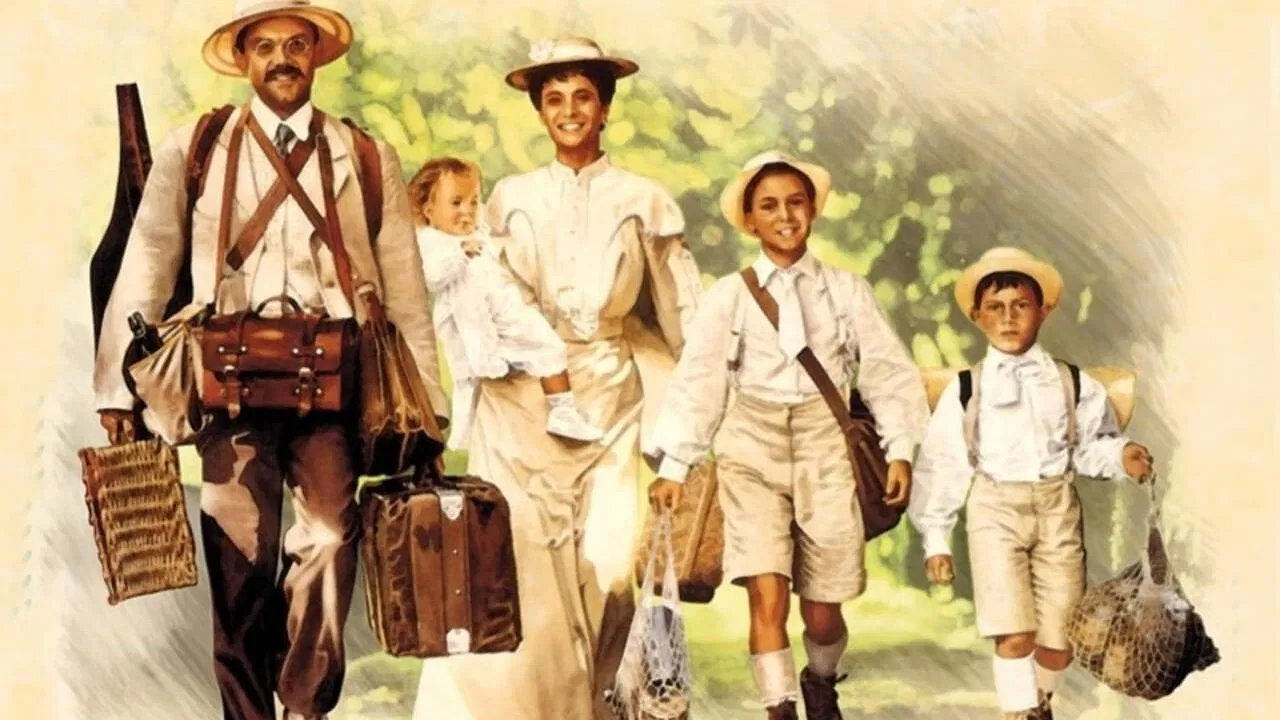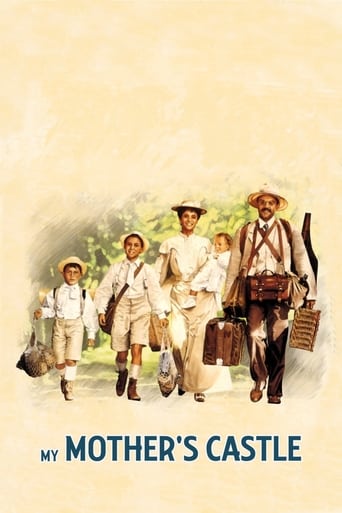

"My Mother's Castle," also known in French as "Le Château de ma mère, is the sequel to a two-part series of films based on famed playwright, novelist and filmmaker Marcel Pagnol's childhood memoirs set in turn of the century France. "My Mother's Castle," is a continuation of the story of Marcel, Pagnol's protagonist, a young boy who grows up under the tutelage of his father, Joseph, a public school teacher in Marseilles. Unlike the first film, "My Father's Glory," the sequel focuses more on Marcel, instead of the uninspiring conflict between father Joseph and Uncle Jules, one a confirmed atheist and the other, a devoted Catholic. Of the two films, I found "My Mother's Castle" superior to "My Father's Glory," not only because it moves at a brisker pace, but there are more interesting things happening to Marcel and his family (instead of the long-winded tale involving hunting).We find out first that the family's trip to the country home outside Marseilles takes place mostly on foot. This becomes an important piece of information later on which will be discussed in a moment. Marcel soon becomes smitten with an eccentric young girl, Isabelle, who orders him to dress up in different outfits. Isabelle's parents are as eccentric as she is, and soon the children's relationship ends when Joseph decries that Marcel isn't allowed to see them again. Interestingly enough, the family is forced to give up their expensive digs after the father, a newspaper columnist, insults his boss and is presumably let go.The encounter with Bouzigue, Joseph's former pupil, leads to some even more interesting complications. Bouzigue is a canal worker, who offers a key to Joseph, that opens various doors along the path next to the canal; this allows the family to take a shortcut and save them hours of traveling to the country home. The only problem is that while taking the shortcut, the family ends up trespassing on the private property of various noblemen who own houses along the waterway. At first, Joseph refuses to even consider the idea, but wife Augustine persuades him to take the shortcut, as it enables the family to make the trip to the country house every week.Joseph ends up rationalizing his decision to accept Bouzigue's offer but deep down knows he's going up against his moral code. It's a fascinating quandary Joseph finds himself in, and I'm sure Joseph's decision will remind most of us that we've occasionally been guilty of an ethical lapse or two in our lives. The family's encounter with the first property owner ends up quite benign as the man turns out to be a thoroughly gracious and helpful fellow. A groundskeeper on another estate allows the family to pass through unimpeded. On the family's second trip, things go completely awry as they find the last door padlocked, and a surly caretaker at the last estate threatens to write an official report that could lead to Joseph being fired and losing his pension. Unlike the first film, there's a real dark moment here, and it's nicely resolved in the third act when Bouzique and his co-workers get the caretaker to tear up his report by threatening him with violating the canal company's rules about padlocking their doors. The story also takes us back to Marseilles where Marcel must pass a big exam to obtain a scholarship at the most prestigious school in the country. Marcel's Mom has a little more to do here than in the first film where she plays the part of a stay at home Mom."My Mother's Castle" ends on a sad note. We learn that Augustine dies five years later and leaves Joseph bereft. Marcel's childhood friend from the countryside, Lili, dies in World War I and brother Paul not long afterward, at the young age of 31. Marcel eventually becomes a film director, and while checking out an old house his company has bought for a film studio, he discovers it's the very same house where his family met the unpleasant caretaker and almost ended Joseph's career."My Mother's Castle" is a wistful remembrance of the childhood of author Pagnol. If we think back, I'm sure there are a few extraordinary tales we can recall about our childhood. The narrative is put together in such a way that it reminds us of how impressionable we can be as children and that the events of those times leave a lasting impression that can never be forgotten, even when one reaches the last days of old age.
... View MoreBoth of these films are excellent autobiographical recollections of the author's youth. I enjoyed them both very much as the subject matter is delivered with aplomb and the photography is stunning. They really take you back to this era, romantic in approach but doesn't neglect the real hardships experienced in that period. The way all emotions are played out is masterful.He also wrote Jean de Flotette and Manon des Sources. If you haven't seen them but enjoyed Le Château de ma mère and La Gloire de mon père then I recommend you do as they are both in a similar vein and are even more stunning.
... View MoreMy Mother's Castle is the distilled essence of nostalgia for lost childhood - we see the hero's story in a golden light of memory, where the desserts are always the most tempting that could ever be, and the dishes never get dirty. The cinematography is stunning - the exact evocation of that warm and golden place in our memories. And the ending is, like it says - stunning, satisfying, perfect. I just love this movie - it's one of life's little miracles.
... View More"My Father's Glory," and its sequel "My Mother's Castle," tell the story of a young boy's "wonder years" growing up in a family with an adored father, a lovely but frail mother, and assorted eccentric relatives and friends. These are incredibly charming films that feature none of the violent action and highly charged emotions that we've come to expect in popular films today. Instead, they celebrate the simple joys of life in a warm and loving family. When minor but unexpected events occasionally disrupt the day-to-day flow of events, they can seem like terrible disasters. On the other hand, a simple visit to the country can seem like a tremendous adventure. It's not necessary to have seen "My Father's Glory" to enjoy "My Mother's Castle." In fact, I happened to see them out of order and I loved them just the same. But if I had my preference, I'd watch them in order. The final scene of "My Mother's Castle" is emotionally powerful and satisfying; for me it confirmed that every minute I'd invested in these films was worthwhile. I wanted to get up there on the screen and help. In French with English subtitles.
... View More